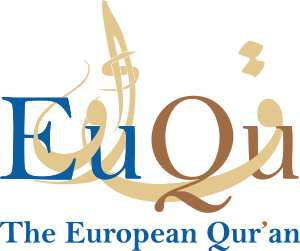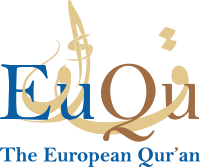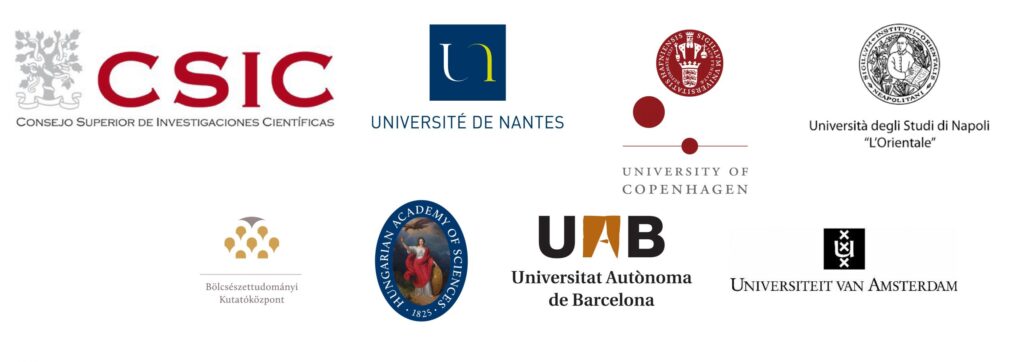Postdoctoral Researchers
Naima Afif obtained a MA and a PhD in Oriental Studies from the Université catholique de Louvain (2015). Her expertise includes Islamic Studies, Biblical languages, Syriac Studies and Digital Humanities.
Her doctoral thesis focused on Hermann Reckendorf's translation of the Quran into Hebrew during the Jewish Enlightenment in Germany. Since 2015, she has been a Scientific Collaborator at the Oriental Institute of Louvain (CIOL) where she has notably worked with the GREgORI Project-Softwares, linguistic data and tagged corpus for ancient GREek. From 2016 to 2020, she held a position of Research Associate at the University of Manchester within the project "The Syriac Galen Palimpsest: Galen's On Simple Drugs and the Recovery of Lost Texts through Sophisticated Imaging Techniques". She also worked with the John Rylands Library/Manchester Digital Collection on TEI XML encoding of manuscript descriptions and of digital editions.
Her research as part of the EuQu Project investigates two indirect translations of the Quran into Hebrew from the 17th and the 18th centuries. It involves a multidisciplinary approach from codicological to cultural studies and computational technologies, including image processing, multilingual corpora and visualisation tools.
Watch below on YouTube his project research presentation
Paul Babinski (PhD, Princeton 2020) studies the history of early modern oriental philology, with a focus on the formative role of Ottoman scholarship in seventeenth and eighteenth-century oriental studies. In his research, he surveys early modern collections of Islamic manuscripts to reconstruct the libraries and scholarly practices of orientalists. His work on the first Western European students of Persian literature and their reliance on Ottoman commentaries and Persian-speaking amanuenses was published in Lias as “Ottoman Philology and the Origins of Persian Studies in Western Europe: The Gulistān’s Orientalist Readers”. As part of the EuQu project in Copenhagen he will study the provenance and readers’ notes of Qur’an manuscripts in early modern Northern European collections to trace how early modern orientalists read the Arabic Qur’an text.
Asaph Ben-Tov (PhD Jerusalem 2007, habil. Erfurt 2019) studies Early Modern intellectual history, especially the Classical Tradition and Oriental Studies in the German speaking territories. In addition to articles on these and related topics, he is the author of Lutheran Humanists and Greek Antiquity (2009) and Johann Ernst Gerhard (1621-1668): A Portrait of a Seventeenth-Century Orientalist (forthcoming) and is co-editor together with Yaacov Deutsch and Tamar Herzig of Knowledge and Religion in Early Modern Europe: Studies in Honor of Michael Heyd (2013) and together with Martin Mulsow: Knowledge and Profanation: Transgressing the Boundaries of Religion in Pre-Modern Scholarship (2019).
Watch below on YouTube his project research presentation
Maurizio Busca achieved in 2017 a joint PhD in French Literature at the Università degli Studi di Torino and the Université Jean Moulin Lyon 3. From 2016 to 2019 he taught French and Italian language, literature and history at the Université Savoie Mont Blanc, and in 2020-2021 he worked as postdoc researcher and a French literature teacher at the Università degli Studi del Piemonte Orientale. His PhD dissertation and a part of his research works were focused on the reception of Latin literature in 16th-17th century France, especially on the articulation between medieval and Renaissance practices of interpretation and translation of Ancient literature. His interests in the perceptions of Islam in Early Modern Europe led him to start in 2015 a research project on the travel journal by Georgius Gemnicensis (Ephemeris, ca. 1513) and, in 2018, to begin a collaboration with the Qur’ān 12-21 project’s team. As a part of this collaboration, he published in 2020 a digital edition of the first European vernacular translation of the Qur’ān (L’Alcorano di Macometto, 1547). Within the framework of the ERC EuQu project, Maurizio Busca studies the information on Islam and the Qur’ān contained in travel narratives of the Early Modern period. Through the indexation of the collected data and the constitution of a digital library, he aims to analyze the dynamics of circulation and transformation of this information.
Ulisse Cecini is a philologist specializing in ancient languages and religious texts and is currently “Ramón y Cajal” researcher at the Universitat Autònoma de Barcelona (UAB). His research interests are Christian-Muslim and Christian-Jewish relations, Oriental studies in medieval and early-modern times, Arabic/Hebrew to Latin translations, Pre-modern translation theories and interreligious cultural transfer. He graduated in Lettere Classiche from the Università Cattolica in Milan (2004) with a study on the poem De triumphis Christi (10th century). He obtained his PhD in medieval Latin from the University of Erlangen in 2010 with a dissertation on Latin Qur’an translations in the 12th and 13th centuries from the Iberian Peninsula (published as Alcoranus latinus in 2012). In addition to Latin and Greek, he is proficient in Arabic, Hebrew and Aramaic, as well as several modern languages. Among his most relevant achievements are the critical edition of the 13th-century Latin translations of the Talmud, in the framework of an ERC CoG project and Spanish Ministry of Science project at the UAB (publ. by Brepols, 2018 and 2021), as well as the critical edition and translation of the religious dialogue Masāʾil Abdallāh Ibn Salām (published in 2021), realised at the University of Bochum within a project fiananced by the German Ministry of Education. Since 2022 he is leading an INVESTIGO (AGAUR) project at the UAB and up to present has also collaborated with several projects of the Spanish Ministry of Science and the Generalitat de Cataluña. He is currently preparing the critical edition of the Latin-Arabic Qur’an translation and commentary Interpretatio Alcorani Litteralis by the Franciscan Dominicus Germanus de Silesia (d. 1670) and a collective volume on Christians and Tafsir.
Watch below on YouTube his project research presentation
Sara Fani (PhD, Un. “L’Orientale” Naples, 2014) combines her codicological interests in Arabic manuscripts with the historical study of their western collectors and collections, their promotion and conservation (cataloguing and exhibitions). During the last decade she has been working in different Italian libraries focussing on Renaissance and early Modern cultural contexts. She presented her PhD dissertation on Arabic medieval treatises on ink production, after a Master's degree in conservation of book materials (Spoleto - Un. Perugia, 2010). She has been post-Doc fellow at the University of Florence with a project on Arabic manuscripts in Renaissance Florence (2019) and collaborated with the Kunsthistorisches Institut in Florenz for the project Die Typographia Medicea im Kontext (2017). She has been previously PostDoc at the University of Copenhagen for the ERC project Islam in the Horn of Africa (2014-2018), working on the Islamic manuscript tradition of that region.
Watch below on YouTube her project research presentation
Octavian-Adrian Negoiță (PhD University of Bucharest, 2020) studies the Byzantine and early modern Greek intellectual history with a special emphasis on the religious polemical literature. He earned two MA degrees: Medieval History (University of Bucharest, 2015) and Comparative History (Central European University, 2017). Octavian also holds two BA degrees (Theology, 2013 and Classical Philology, 2015), both awarded by the University of Bucharest. For the EuQu project, he conducting research on a book project tentatively entitled “The Holy Book of the Ishmaelites in the World of Greek Christianity (12th-18th Centuries)”.
Watch below on YouTube his project research presentation
Giovanni Maria Martini’s (PhD, Un. “L’Orientale” Naples, 2014) main research area is Islamicate intellectual history with a special focus on Sufism, Occult Sciences and their intersection with Qurʾanic disciplines. In 2015 he took up the post of PostDoc at the University of Oxford for the ERC Project IMPAcT, From Late Medieval to Early Modern: 13th to 16th Century Islamic Philosophy And Theology. He was subsequently a PostDoc at the Alexander von Humboldt Kolleg for Islamicate Intellectual History, at the University of Bonn. In 2018 he was awarded a two-year individual research grant by the Gerda Henkel Foundation to work on a project entitled Shīrīn Maghribī: A Key Agent in the Transmission of Mystical Knowledge in 14th to 17th Century Sufi Networks. As part of the EuQu Project in Naples Martini will follow two lines of research: first investigating Athanasius Kircher’s (d.1680) knowledge of Islamic sources and his reflections on the central role of the Qurʾan in the definition of 'Islamic magic' according to his work entitled De Cabala Saracenica (Rome 1653), and secondly preparing a study on Gustav L. Flügel’s (d.1870) very influential edition of the Qurʾan (Corani Textus Arabicus, Leipzig 1834) which after its release served as the reference edition text of the Qurʾan for many western scholars and translators for over a century.
Florence Ninitte gained a BA and MA in Romance Studies at the Université catholique de Louvain where she also achieved a PhD in Medieval Languages in December 2016. Her doctoral dissertation, 'La tradition arabo-musulmane dans le Speculum historiale et dans sa traduction française par Jean de Vignay. Enjeux d’un transfert culturel', considers the reception and the integration of Arabic texts about Islam in the Speculum historiale (SH) and in its French translation by Jean de Vignay. The main purpose of this work was to to explore the renewal of the description of Islam and its prophet through medieval encyclopaedism and the consequences of this renewal on the ambiguous relationship that existed between the medieval West and Islam during the thirteenth and fourteenth centuries. For the past two years Florence has held the position of scientific collaborator in the Institut des Civilisations, Arts et Lettres at the Université catholique de Louvain. Her research has focused on the transmission of Arabic texts (scientific and theological) into the medieval West and particularly the figure of Arnoul de Quincampoix, astrologer, physician and translator at the French court (early 14th century). Within the framework of the ERC EuQu project, her postdoctoral research, 'A Second-hand Qur’ān: The Role of the Apology of al-Kindī in the Transmission of Fragments of the Qur’ān in Medieval French Literature', will consider the indirect reception of the Qur’ān in the medieval French literature – and more specifically in Jean de Vignay’s Miroir historial and Jean Germain’s Débat du Crestien et du Sarrasin –, through the Apology of al-Kindī.
Watch below on YouTube her project research presentation
Irene Reginato (1987) has a joint PhD in Romance Philology at Ca 'Foscari University of Venice and École Pratique des Hautes Études in Paris. Her PhD dissertation was on the Catalan version of Marco Polo's Devisement du Monde and was supervised by Eugenio Burgio and Fabio Zinelli. From 2016 to 2018 she worked on the manuscript tradition of the Ovide moralisé as Post Doc researcher at Université Libre de Bruxelles. From October 2018 to September 2019 she collaborated in the edition of medieval French juridical texts within Frédéric Duval’s Miroir des classique project at École Nationale des Chartes in Paris. Her research interests focus on travel and crusade literature in romance medieval languages, especially Geoffroy de Villehardouin, Marino Sanudo Torsello, Marco Polo and Giovanni Battista Ramusio. Her research activity in the EuQu project is devoted to the edition of Jean Germain’s Debat du Crestien et du Sarrazin.
Watch below on YouTube her project research presentation
Michael E. Pregill (PhD Columbia University, 2008) is a scholar of the Qur’an and its interpretation; the origins of Islam in the late antique milieu; and Muslim relations with non-Muslims. He has held a number of academic positions, including Assistant and Associate Professor of Religious Studies and Distinguished Emerging Scholar at Elon University (2007–2014) and Interlocutor in the Institute for the Study of Muslim Societies and Civilizations at Boston University (2015–2018), where he directed the Mizan digital scholarship initiative and edited the peer-reviewed, open access Mizan: Journal for the Study of Muslim Societies and Civilizations. He also served as editor of the Journal of the International Qur’anic Studies Association from 2015 to 2018, and is currently co-chair of the Qur’an and Late Antiquity program unit of IQSA. He is the author of numerous peer-reviewed journal articles, review essays, book chapters, and public scholarship pieces. His monograph The Golden Calf between Bible and Qur’an: Scripture, Polemic, and Exegesis from Late Antiquity to Islam was published by Oxford University Press in 2020. Under the auspices of the EuQu project, he will be researching and writing a new monograph, “Re-Orienting Geiger: Revisiting the Jewish Foundations of Western Qur’anic Studies,” which reevaluates the contribution of Abraham Geiger (d. 1874) to the modern study of the Qur’an and the relationships between Bible, Qur’an, midrash, and tafsir explored in Geiger’s classic Was hat Mohammed aus dem Judenthume aufgenommen?(1833).
Pablo Roza Candás (PhD, University of Oviedo, 2009) has specialized in the study of the Aljamiado manuscript production of the Mudejar and Morisco minorities. Besides the edition and study of the Aljamiado corpus, his research interests focus on the cultural and religious practices of the Iberian Crypto-Islamic communities.
Prior to joining Naples EuQu team, he has worked as a lecturer and researcher in several universities in Europe, the Maghreb and the Middle East: American University in Dubai (United Arab Emirates), University of Carthage (Tunisia), Carlos III University of Madrid, University of Santiago de Compostela (Spain), and the National Institute of Oriental Languages and Civilisations (INALCO) of Paris. He has also been a visiting scholar at the Hebrew University of Jerusalem, Oxford University, and the National Library of Algiers, among other institutions.
In recent years he has led two research projects on the Aljamiado texts and Digital Humanities funded by the Marie Curie – Clarín Cofund Program: «Digital Aljamiado: Development and Application of Digital Humanities Methodology to Spanish Aljamiado Corpus» (INALCO - Paris, 2014-2016) and «Corpus Aljamiado Hispánico (CAHi): New Technologies application in Multiversion Texts Digital Edition» (University of Oviedo, 2018-2020). At the same time, he participated in several national and international funded projects, like ALIENTO «Linguistic and Intercultural Analysis of Sapiential Statements and their Transmission Orient / Occident and Occident / Orient (ALIENTO)» funded by the French National Research Agency (ANR).
His most recent publications include Memorial de ida i venida hasta Maka. La peregrinación de Omar Patón (Oviedo, 2018); «Vers un corpus numérique aljamiado. Quelques exemples d’encodage XML-TEI» (Tunis, 2018), and «Ciencia y creencia en la terapéutica morisca (El manuscrito aljamiado de la Arcadian Library de Londres)», Cuadernos Hispanoamericanos (2020).
Watch below on YouTube his project research presentation
Biography
Davide Scotto works as a postdoctoral researcher at the University of Naples L’Orientale. He specializes in the study of intellectual Christian interactions with Judaism and Islam in premodern Europe and the Mediterranean. He has studied Church history in Turin (BA), medieval history in Pavia (MA), and philology in Florence (PhD). Between 2013 and 2021, he has worked as a researcher and lecturer at the Center for Islamic Theology and the Protestant Faculty of Theology of the University of Tübingen, the Department of History of the University of Basel, and the Department of History of the Goethe University Frankfurt. Concurrently, he has participated in the ERC Advanced Grant Project Conversion, Overlapping Religiosities, Polemics and Interaction. Early Modern Iberia and Beyond at the CSIC, Madrid, and has been a visiting lecturer at the Department for the Study of Religions of the Masaryk University, Brno. He lectures in the history of the Abrahamic religions at the University of Pavia and is an editorial assistant of the Rivista di Storia e Letteratura Religiosa. In 2019, he was among the co-founders of the Centro di Studi Interreligiosi, Almo Collegio Borromeo, Pavia.
Research project
The aim of the project is to trace the early development of the theological Christian debate on the Qur’ān by comparing a variety of Latin sources produced from the twelfth to the fifteenth century in an area ranging from the Iberian Peninsula to Southern Germany, and from Rome to the Near East. The project aims to overcome the static historiographic concept of polemics showing how it is extensively indebted with a binary opposition between Christianity and Islam that stems from twentieth-century perspectives. Under the assumption that medieval scholars instead looked at the Qur'ān from a tripartite perspective which embraced both Judaism and Islam, the project will discuss the ways in which Christians understood the Qur'ān through the lens of the Bible and pondered over the figure of Abraham as a point of departure, conciliation, or contention between faiths and scriptures.
Gulnaz Sibgatullina is a postdoctoral research fellow at Amsterdam School of Historical Studies at the University of Amsterdam. Her research interests lie in the intersection of several fields: (post)colonial translation studies, Muslim-Christian relations and religious language. In 2019 she obtained a PhD degree at Leiden University (the Netherlands); her dissertation on Languages of Islam and Christianity in Post-Soviet Russia was published as a monograph at Brill in 2020. In the past, she was also a visiting scholar at the Goethe University Frankfurt, the University of Edinburgh, and the University of Illinois in Champaign-Urbana. Outcomes of her research have been published as single and co-authored papers in high-ranking journals, such as Islam and Christian-Muslim Relations, Religion, State & Society, and the International Multilingual Research Journal, and have formed the basis of several chapters appearing in edited volumes.
Katarzyna K. Starczewska is a Juan de la Cierva post-doctoral researcher at the Spanish National Research Council (CCHS-CSIC) in Madrid. In 2012 she presented her PhD dissertation at the Autonomous University of Barcelona entitled Latin Translation of the Qur’ān (1518/1621) commissioned by Egidio da Viterbo. Critical Edition and Introductory Study. Katarzyna is currently working on a number of topics which revolve around the theme of explaining Muslim culture in Latin. Her interests include networks of early modern translators whose target language was Latin, the reflection of Latin interreligious polemics on early modern treatises in national languages, and the early modern grammar books of Arabic written in Latin. She is an author of numerous papers and book chapters. Her fist book Latin Translation of the Qur’ān commissioned by Egidio da Viterbo was published in Diskurse der Arabistik, Otto Harrassowitz Verlag, in 2018.
Watch below on YouTube her project research presentation
Emmanuelle Stefanidis has a multidisciplinary background in anthropology, history, literature, and Arabic studies. Her research focuses on the Qur’an and its reception across historical and cultural contexts. Her dissertation (2019, Sorbonne Université) explored the development of diachronic readings of the Qur’an in both Muslim exegetical traditions and Euro-American scholarship. Portions of this work have been published in the Journal of Qur’anic Studies and ReOrient: A Forum for Critical Muslim Studies.
As part of the EuQu project, Emmanuelle investigates the intersections between literary, philological, and mystical approaches to the Qur’an in modern Europe. One strand of her research traces the rise of a literary curiosity for Qur’anic narratives and other “Oriental” tales during the Grand Siècle, with particular attention to D’Herbelot’s seminal Bibliothèque Orientale (1697). Another project explores the fascination exerted by the Qur’an and the figure of Muhammad on key writers of the Romantic era, including Goethe, Hugo, and Pushkin.
Watch below on YouTube her project research presentation
Federico Stella (PhD in Oriental Studies from Sapienza University of Rome, 2014) is a Post-Doc at the University of Naples L’Orientale. Within EuQu, his main field of research is the circulation, reception, and translations of the Qur’an and Islamic literature in the early modern Catholic world (17th–19th centuries), with a particular focus on the Society of Jesus. He is interested in conversions, Orientalism, missions, and has carried out extensive archival research in ecclesiastical and state archives. During his work at EuQu, he has organized numerous conferences and study days, published articles in academic journals and collective volumes, and co-edited with Roberto Tottoli the book The Qur’an in Rome: Manuscripts, Translations, and the Study of Islam in Early Modern Catholicism. He is currently working on his monograph about the letters exchanged by Baldassarre Loyola Mandes S.J. (1631–1667) with Muslim slaves regarding Islam and the Qur’an.
Watch below on YouTube his project research presentation






